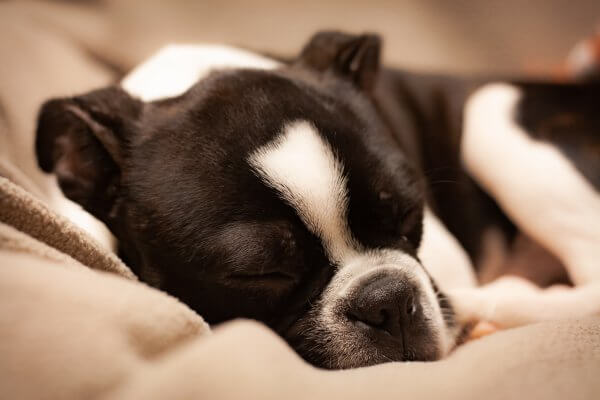Dogs sleep a lot, just like babies do. You may be just now observing your dog sleep for the majority of the day for the first time if your schedule recently changed. It’s amazing but true: your pet sleeps the majority of the day. While it’s common for dogs to sleep through the night, many dogs also spend a large portion of the day asleep. If you realize that your dog is sleeping during the day, don’t worry. But if your dog’s too much sleeping is becoming a problem, it might be time to examine the cause.
You should closely monitor your dog’s sleep cycle because adjustments in sleeping habits can be brought on by illness or growing older.
Here are some tips on how to keep your dog active throughout the day so they stay alert, as well as when to call for assistance.
The AKC has provided a general breakdown of a dog’s activity level.
- sleeping for half the day (12-14 hours a day)
- 30% awake, but just idling (about 7 hours a day)
- 20 active (about 5 hours a day)
Reason for dog sleeping all day long
The reasons why your dog is sleeping a lot may be due to the following;
-
Age
Dogs can sleep for up to 14 hours each day, which is often between 12 and 14. Puppies may sleep up to 18 hours a day, which is perfectly acceptable, and large dog breeds, old dogs, and puppies all require more sleep. You can let your dog sleep all day long.
Puppies
The first six to twelve months of your dog’s life, when it is a puppy, are when it will require the most sleep. For healthy development, puppies need between 18 and 20 hours of sleep per day.
Adult dogs
Your dog will begin sleeping a little less than when it was a puppy once it is between one and five years old. Adult dogs should sleep eight to fourteen hours a day, to be their happiest, healthiest selves.
Senior dogs
Dogs between the ages of five and ten begin to require more sleep. Similar to when they were puppies, senior dogs sleep 18 to 20 hours daily. If your older dog spends the majority of the day sleeping, it’s probably nothing to worry about.
In general, puppies and old age are the times when dogs sleep the most. Puppies between the ages of 4 months and 1 year are only playful and energetic when awake. The puppies’ active lifestyles may be the cause of their proneness to exhaustion.
-
Health and Surroundings
Your dog’s environment has an impact on how they sleep as well. Your dog may also experience stress and anxiety from loud noises in the environment or from nearby traffic, which makes it harder for them to fall asleep. Dogs’ sleep patterns may also be disturbed by underlying health issues. For instance, frequent urination caused by a metabolic or urinary condition makes it challenging for dogs to sleep for extended periods. In addition, your dog may struggle to get a good night’s sleep due to pain, itching, or coughing brought on by health problems with their joints, skin, or heart.

-
Dog Breed
The size, activity, and aging rate of a dog are all influenced by its breed. The amount of sleep the dog needs can vary depending on all of these factors. A smaller dog breed typically lives longer and sleeps less at night.
You may find following breed sleeping all day: English bulldog, Shin Tzu, Mastiff, and Basset Hound because they enjoys sleep alot. Because of their propensity for sleeping, breeds including Greyhounds, Bullmastiffs, Chows, Saint Bernards, Basset Hounds, and Newfoundlands are well-known for being “lazy dogs.” They can sleep for up to 18 hours per day. The ranking of Dog Sleeping Breeds is following:
- English Bulldog
- Shih Tzu
- Mastiff
- Basset Hound
- English Greyhound
- Lhasa Apso
- Cavalier King Charles Spaniel
- Saint Bernard
- Chow Chow
- French bulldog
- Pekingese
- Great Dane
- Cocker Spaniel
- Pug
- The Pyrenees
-
Stress, Anxiety, and Boredom
A dog experiencing emotional problems, such as anxiety, stress, or boredom, would sleep a lot. If your dog is stressed or anxious, you’ll notice that they become lethargic and frequently fall asleep. Giving the dog a routine of activities can help to stimulate and improve both its mental and physical health. If dog sleeping all day than it maybe due to stress, anxiety and boredom.
-
Activity Level
Activity Level Dogs that are given tasks to complete will spend the majority of the day working on those tasks. The amount of sleep a dog requires also depends on the job for which they were bred.
-
Bacterial Infection and Viral Infection
Bacterial and viral infections can cause affect a dog’s sleeping routine.
Leptospirosis
This is a highly contagious infection brought on by bacteria. Leptospirosis can be contracted by dogs coming into direct contact with human or canine-infected urine. Additionally, it is easily transmissible through water, soil, etc. In warm climates, it is most prevalent.
Parvovirus
This viral illness is very contagious. primarily found in puppies between the ages of six weeks and six months, before adolescence. An affected animal will quickly become dehydrated and weak from a lack of protein and fluid absorption and nutrients essential to the dog’s body because of the virus, which comes from the Parvoviridae family and affects the ability to absorb nutrients. Early puppy vaccination is the most effective way to stop this fatal infection.
How to Improve Your Dog’s Sleep
Some people complain that their dog sleeping all day and some say something contradicting. There are several ways you can take to change your dog’s sleeping patterns if you notice they are either excessively or insufficiently restful.
- Find them a peaceful sleeping space
- Limit Water Before Bed
- Provide your dog with a comfortable bed
- Ensure that your dog exercises throughout the day.
- take your dog outside before bed to relieve itself
- Try Melatonin
- Keep awake people away from where your dog is sleeping.
How Much Sleep Does Your Dog Need?
If your dog sleeps all day then don’t need to worry, sometimes it is common. Dogs sleep more than people do. The recommended amount of sleep for an adult human is 7-9 hours per night. On the other hand, Dogs sleep for 12 to 14 hours every Day. In general, dogs will sleep when they are not stimulated and when their owners are at ease or asleep.
Now, it might be difficult to imagine a dog sleeping all day for 12 and more hours if you have one that wakes you up in the middle of the night. Dogs don’t sleep like we do, though. The majority of people follow a diurnal sleep cycle, sleeping at night and being active during the day. If you’re lucky, you get 7-9 hours of uninterrupted sleep each night. However, dogs rarely get to sleep for the entire night. Although many dogs do sleep with their owners through the night, this is not the only time they sleep. Instead, they typically snooze on and off as the mood strikes.
[su_spoiler title=”Source” icon=”plus-square-2″]https://www.petmd.com/dog/general-health/how-many-hours-does-dog-sleep-day[/su_spoiler]


